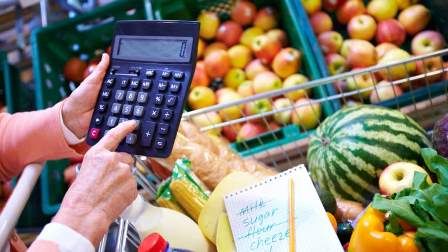
Average household food basket increased by R572.64 in February year-on-year
The cost of the average household food basket increased by R572.64 or 13.1% more from R4 355.70 February last year to R4 928.34 February this year, according to the February 2023 Household Affordability Index.
This is according the Pietermaritzburg Economic Justice & Dignity Group (PMBEJD), a civil society initiative that focuses on issues of economic justice, the low-wage regime and on the increasing household affordability and food price crisis.
The average cost of the foods prioritised and bought first in the household food basket decreased by R0.59 (0.0%) from R2 706.13 in January to R2 705.53 in February.
PMBEJD said core foods were bought first to ensure that families did not go hungry while ensuring that meals could be cooked.
When the prices of core foods increases, there is less money to secure other nutritionally-rich foods, which are essential for health and well-being and strong immune systems.
PMBEJD programme coordinator Mervyn Abrahams, said at an average cost of R2 705.53 in February, these foods were relatively very expensive in relation to the total money available in the household purse to secure food.
“These foods must be bought regardless of price escalations. The high cost of core staple foods result in a lot of proper nutritious food being removed off the family plates. The consequences of high costs on the core foods has a negative impact on overall household health and well-being, and child development,” Abrahams said.
Foods, which increased in price by 5% or more in February included maize meal (up by 6%), samp (5%), butternut (7%), spinach (14%), cabbage (15%), green pepper (6%), and oranges (21%). Other items which increased in price in the same period by 2% or more, included rice (2%), salt (2%), soup (2%), inyama yangaphakathi (4%), tomatoes (2%), bananas (4%) and apples (3%).
The Joburg basket increased by R50.13 (1.0%) month-on-month, and increased by R512.82 (11.6%) year-on-year, to R4 923.41 in February. The Durban basket decreased by R6.39 (-0.1%) and increased by R540.03 (12.2%) year-on-year, to R4 968.59. The Cape Town basket decreased by R6.02 (-0.1%) and increased by R739.30 (17.6%) to R4 942.45.
The Springbok basket increased by R278.48 (5.8%) month-on-month, and increased by R484.84 (10.6%) to R5 055.61. The Pietermaritzburg basket decreased by R99.21 (-2.0%) and increased by R566.19 (13.5%), to R4 751.76.
Abrahams said Statistics South Africa’s latest Consumer Price Index for January this year showed that Headline inflation was 6.9%, and for the lowest expenditure quintiles 1-3, 10.8%, 10.3% and 9%, respectively.
He said that according to the PMBEJD’s food inflation data, which specifically looks at families earning low incomes, was 13.1% on the average household food basket in February and 11.9% on their nutritional food basket for children.
“Inflation affects people differently depending on (1) how much people earn, (2) what they spend their money on, and (3) how much they spend. People on low incomes tend to spend most of their small amounts of money on just a few items viz. food, electricity, transport, domestic and hygiene products, education resources and clothes for their children, burial insurance, and debt repayments. Of these items, most of the household budget is spent on food.”
The National Agricultural Marketing Council (NAMC) 28-item urban food basket based on comparisons between the average food price data for January this year and January last year showed that the nominal price of the NAMC's 28-item urban food basket increased by 11.2%, costing R1 130.76 versus R1 017.24, or 0.02% less monthly. In January 2023, 24 of the 28 food items had price increases that exceeded the South African Reserve Bank's (SARB) 6% inflation target.
These products include onions (51.9%), followed by apples (29.8%), maize meal (26.5%), Ceylon/black tea (24.4%), white bread (20.6%), brown bread (20.3%), instant coffee (20.2%), sunflower oil (19.8%), brick margarine (16.4%), chicken giblets (16.4%), full cream long life milk (15.8%), baked beans (15.8%), tinned fish (14.4%), cheddar cheese (13.2%), beef mince (11.7%), potatoes (11.3%), cabbage (11.2%), peanut butter (10.1%), IQF chicken portions (9.4%), polony (7.6%), white sugar (7.4%), eggs (7.4%), dried beans (6.6%) and oranges (6.2%).
BUSINESS REPORT
News Category
- International retailers
- On the move
- Awards and achievements
- Legislation
- Wine and liquor
- Africa
- Going green
- Supplier news
- Research tools
- Retailer trading results
- Supply chain
- Innovation and technology
- Economic factors
- Crime and security
- Store Openings
- Marketing and Promotions
- Social Responsibility
- Brand Press Office
Related Articles

Empowering South African households through gro...

SPAR shares practical tips to beat food inflation

South African motorists could be paying up to R...

Big VAT changes on the cards


